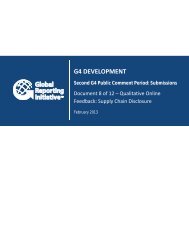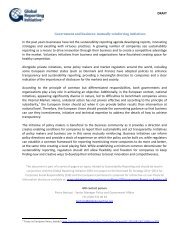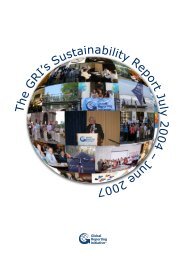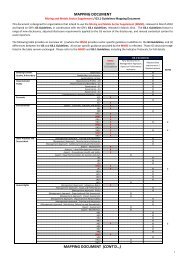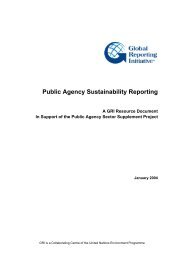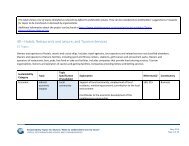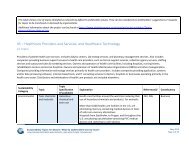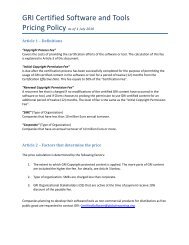CARROTS AND STICKS – PROMOTING ... - Global Reporting Initiative
CARROTS AND STICKS – PROMOTING ... - Global Reporting Initiative
CARROTS AND STICKS – PROMOTING ... - Global Reporting Initiative
You also want an ePaper? Increase the reach of your titles
YUMPU automatically turns print PDFs into web optimized ePapers that Google loves.
86 Carrots and Sticks - Promoting Transparency and Sustainability<br />
Recommendations to government<br />
officials, politicians and other<br />
stakeholders with an interest in<br />
regulation<br />
Institutional and legislative<br />
fragmentation<br />
The art of government is knowing<br />
how, where, and when to intervene,<br />
using its full range of tools from<br />
regulation (both ‘hard’ and ‘soft’<br />
laws) through subsidies to the use of<br />
‘soft power’ (Hohnen, 2007). Finding<br />
the right mix of policies to promote<br />
sustainability reporting and ultimately<br />
the transparency and accountability<br />
of organisations is seen as one of<br />
the key challenges. This requires<br />
careful analysis of existing policies<br />
and considering ways of promoting<br />
harmonisation of approaches to<br />
ensure that new expectations of an<br />
evolving agenda are met.<br />
A UNEP Workshop on sustainability<br />
reporting in 2005 came to the<br />
conclusion that “in most countries,<br />
reporting requirements on various/<br />
specific issues are still dispersed<br />
throughout national legislation. A first<br />
challenge for governments is simply<br />
to take stock of current reporting<br />
requirements for companies, laying<br />
the ground for improved integration<br />
and development of comprehensive<br />
sustainability reporting legislation.” 31<br />
This statement is still valid in 2010.<br />
A key characteristic of sustainability<br />
reporting standards is that they are<br />
still dispersed in different sectoral<br />
laws under different institutional<br />
entities. This reflects historical<br />
approaches in dealing with societal<br />
problems, which in the environmental<br />
field often involved introducing<br />
disclosure requirements focussed on<br />
individual resources, media and point<br />
sources of pollution. In a context of<br />
more complex supply and demand<br />
relations and a globalised world<br />
economy today, these approaches<br />
need to be complemented by more<br />
effective and integrated approaches.”<br />
It is therefore proposed that<br />
governments considering the<br />
introduction of new public policies on<br />
31 http://www.unepie.org/scp/gri/pdf/SectorMeet.pdf (last visited<br />
8 February 2010).<br />
reporting should, among other things,<br />
take into consideration the following:<br />
� Existing legislative framework:<br />
Analysis of any policies or action<br />
plans across sectors. Analysis<br />
of legislation across sectors<br />
(e.g. company, environment,<br />
accounting legislation).<br />
� Existing institutional framework:<br />
Review of institutional mandates.<br />
Analysis of competent authorities<br />
and ministries involved in<br />
financial and sustainability<br />
reporting. How is communication<br />
between institutions organised?<br />
Is a coordination mechanism or<br />
procedure in place?<br />
� Identification of the main nonstate<br />
actors in the field of<br />
sustainability reporting, and<br />
relevant actors such as rating<br />
agencies and investment<br />
analysts active at the interface<br />
of financial and sustainability<br />
reporting.<br />
� Cooperation with national stock<br />
exchanges (e.g. minimum set of<br />
ESG disclosure requirements for<br />
listed companies).<br />
� Increased interdependency<br />
between actors and countries<br />
beyond the nation-state and<br />
its borders, an aspect of<br />
globalisation that requires<br />
coordinated regulatory<br />
approaches among countries.<br />
� Analysis of relevant international<br />
reporting standards, codes<br />
and guidelines, accompanied<br />
by a comparison of existing<br />
internationally accepted<br />
guidelines/standards and national<br />
frameworks.<br />
� Promotion of coherence and<br />
convergence at the international<br />
level when contributing to<br />
the elaboration/revision of<br />
international standards. When<br />
approaching international<br />
standards, consider their<br />
credibility and voluntary nature,<br />
mindful of the supremacy (and<br />
therefore responsibility) of<br />
national laws and regulations.<br />
� Take into consideration the<br />
international standards when<br />
acting at the national level,<br />
meeting local needs whilst<br />
considering internationally<br />
recognised expectations<br />
and avoiding unnecessary<br />
proliferation of standards. There<br />
is a growing international interest<br />
in methods and approaches<br />
that enable comparison across<br />
countries and enable markets to<br />
function in a more sustainable<br />
manner.<br />
Annex 1 provides a list of eight basic<br />
sets of questions a governmental<br />
official new to this terrain needs to<br />
ask. The listing is not exhaustive,<br />
but provides an indication of key<br />
considerations at stake when<br />
approaching the subject. It has been<br />
created with governmental authorities<br />
in mind that are approaching the<br />
topic comprehensively for the<br />
first time. We trust that this will<br />
help identify support that may be<br />
required in deciding where to start<br />
when evaluating the local reporting<br />
landscape and the status nationally<br />
compared to developments abroad.





